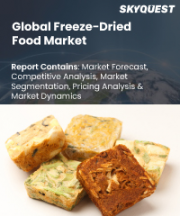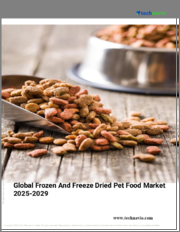
|
시장보고서
상품코드
1722468
동결 건조 식품 시장 보고서 : 유형, 유통 채널, 최종사용자, 지역별(2025-2033년)Freeze-Dried Food Market Report by Type, Distribution Channel, End User, and Region 2025-2033 |
||||||
동결 건조 식품 세계 시장 규모는 2024년 30억 달러에 달했습니다. 향후 IMARC Group은 2033년까지 54억 달러에 달하고, 2025-2033년 6.6%의 연평균 성장률(CAGR)을 보일 것으로 전망하고 있습니다. 식음료(F&B) 및 접객업 분야에서 동결건조 기술의 채택 증가, 소비자들 사이에서 신선하지 않은 조리된 식품(RTE)에 대한 수요 증가, 식품의 질감, 맛, 영양가를 개선하기 위한 광범위한 조사 개발(R&D) 활동 등이 시장을 이끄는 주요 요인 중 일부입니다.
동결건조 또는 동결건조는 진공 챔버에서 다양한 식품을 동결시키는 저온 탈수 기술을 말합니다. 동결건조는 공기, 빛, 수분이 있는 상태에서 미생물의 증식으로 인한 오염과 부패의 위험을 제거하여 식품을 보존하는 데 도움이 됩니다. 이를 통해 동결건조 식품은 품질 유지, 영양가 유지, 유통기한 연장, 경량화를 위해 제품에서 수분량을 줄일 수 있습니다. 현재 동결 건조 식품은 분말, 과립, 덩어리, 조각, 플레이크 등 다양한 형태로 시판되고 있습니다.
동결 건조 식품 시장 동향 :
과일, 채소, 베이커리, 육류, 유제품, 스낵 등 다양한 식품을 보존하기 위해 식음료(F&B) 및 접객업 분야에서 동결건조 식품이 널리 채택되고 있는 것이 시장 성장을 가속하는 주요 요인 중 하나입니다. 이와 함께, 식품 가공 부문의 급속한 확장, 이동 중에도 먹을 수 있는(on-the-go) 경향 증가, 바쁜 근무 일정, 라이프스타일의 변화로 인한 부패하기 쉬운 즉시 먹을 수 있는(RTE) 식사 및 편의 식품 제품에 대한 수요 증가가 다른 성장 촉진요인으로 작용하고 있습니다. 또한, 코로나바이러스 감염증(COVID-19)의 갑작스러운 대유행과 이에 따른 세계 각국의 봉쇄 조치로 인해 냉동식품 구매 및 주문에 온라인 및 전자상거래 유통 채널이 대량으로 사용되면서 시장 성장에 기여하고 있습니다. 식품의 안전한 운송을 가능하게 하는 동결건조 기술의 광범위한 사용은 장기 보관과 편리한 소비를 가능하게 하는 반려동물사료 분야로의 대규모 통합과 함께 시장 성장을 더욱 크게 촉진하고 있습니다. 이 밖에도 주요 기업 간의 전략적 제휴, 인공 첨가물의 유해성에 대한 소비자의 인식 증가, 가볍고 영양가 높은 동결건조 스낵을 도입하기 위한 연구개발 활동에 대한 지속적인 투자 등이 시장 전망을 밝게 하고 있습니다.
본 보고서에서 다룬 주요 질문
- 2024년 세계 동결 건조 식품 시장 규모는?
- 2025-2033년 동결 건조 식품 세계 시장 성장률 전망은?
- 동결건조 식품 세계 시장을 이끄는 주요 요인은?
- 코로나19가 냉동건조식품 세계 시장에 미치는 영향은?
- 냉동건조식품 세계 시장 유형별 분류는?
- 냉동건조식품 세계 시장 유통채널별 분류는?
- 냉동건조식품 세계 시장 주요 지역은?
- 세계 냉동건조식품 시장의 주요 기업은?
목차
제1장 서문
제2장 조사 범위와 조사 방법
- 조사 목적
- 이해관계자
- 데이터 소스
- 1차 정보
- 2차 정보
- 시장 추정
- 보텀업 접근
- 톱다운 접근
- 조사 방법
제3장 주요 요약
제4장 서론
- 개요
- 주요 업계 동향
제5장 세계의 동결 건조 식품 시장
- 시장 개요
- 시장 실적
- COVID-19의 영향
- 시장 예측
제6장 시장 분석 : 유형별
- 동결 건조 과일
- 동결 건조 채소
- 동결 건조 음료
- 동결 건조 유제품
- 동결 건조 고기 및 어개류
- 기타
제7장 시장 분석 : 유통 채널별
- 슈퍼마켓 및 하이퍼마켓
- 전문 소매업체
- 편의점
- 기타
제8장 시장 분석 : 최종사용자별
- 호텔 및 레스토랑
- 가정
- 식품 및 음료 업계
- 기타
제9장 시장 분석 : 지역별
- 북미
- 미국
- 캐나다
- 아시아태평양
- 중국
- 일본
- 인도
- 한국
- 호주
- 인도네시아
- 기타
- 유럽
- 독일
- 프랑스
- 영국
- 이탈리아
- 스페인
- 러시아
- 기타
- 라틴아메리카
- 브라질
- 멕시코
- 기타
- 중동 및 아프리카
- 시장 내역 : 국가별
제10장 SWOT 분석
- 개요
- 강점
- 약점
- 기회
- 위협
제11장 밸류체인 분석
제12장 Porter의 Five Forces 분석
- 개요
- 바이어의 교섭력
- 공급 기업의 교섭력
- 경쟁 정도
- 신규 진출업체의 위협
- 대체품의 위협
제13장 가격 분석
제14장 경쟁 구도
- 시장 구조
- 주요 기업
- 주요 기업 개요
- Ajinomoto Co. Inc
- Asahi Group Holdings Ltd.
- Crispy Green Inc.
- European Freeze Dry ApS
- Freeze-Dry Foods Ltd.
- Harmony House Foods Inc.
- Kerry Group Plc
- LYO FOOD Sp. z o.o.
- Mercer Foods LLC
- Nestle S.A.
- Nuts.com
- SouthAm Freeze Dry S.A.(R. J. Van Drunen & Sons Inc.)
- The Kraft Heinz Co.
The global freeze-dried food market size reached USD 3.0 Billion in 2024. Looking forward, IMARC Group expects the market to reach USD 5.4 Billion by 2033, exhibiting a growth rate (CAGR) of 6.6% during 2025-2033. The increasing adoption of freeze-drying technology in food and beverage (F&B) and hospitality sectors, the rising demand for non-perishable, ready-to-eat (RTE) meals among the consumers, and extensive research and development (R&D) activities to improve the food texture, taste, and nutritional value are some of the key factors propelling the market.
Freeze-dried or lyophilization refers to a low-temperature, dehydration technique that involves freezing of various food products in the vacuum chamber. It aids in preserving food commodities by eliminating the risk of contamination and decomposition caused by microbial growth in the presence of air, light, and moisture. This, in turn, assists freeze-dried food in retaining its quality, maintaining nutritional values, extending shelf-life and reducing water quantity from the product for making it lightweight. At present, freeze-dried food is commercially available in varying forms, such as powders, granules, chunks, pieces, and flakes.
Freeze-Dried Food Market Trends:
The widespread adoption of freeze-dried food in the food and beverage (F&B) and hospitality sectors for preserving various food products, such as fruits, vegetables, bakery, meat, dairy, and snacks, is one of the prime factors driving the market growth. In line with this, rapid expansion in the food processing sector and the increasing demand for non-perishable, ready-to-eat (RTE) meals or convenience food products due to the rising on-the-go trend, hectic working schedules, and evolving lifestyles are acting as other growth-inducing factors. Additionally, the sudden outbreak of coronavirus disease (COVID-19) pandemic and the consequent implementation of lockdowns across the globe have led to the massive employment of online and e-commerce distribution channels for purchasing and ordering frozen food, which, in turn, is contributing to the market growth. The extensive utilization of freeze-dried techniques for enabling the safe transportation of food products, along with its large-scale incorporation in pet food segment to enable longer preservation and convenient consumption is further considerably propelling the market growth. Other factors, such as strategic collaborations between top players, rising consumer awareness regarding the harmful effects of artificial additives, and the continuous investments in research and development (R&D) activities for introducing lightweight, freeze-dried nutritious snacks, are creating a positive outlook for the market.
Key Market Segmentation:
Breakup by Type:
- Freeze-Dried Fruits
- Freeze-Dried Vegetables
- Freeze-Dried Beverages
- Freeze-Dried Dairy Products
- Freeze-Dried Meat and Seafood
- Others
Breakup by Distribution Channel:
- Supermarkets and Hypermarkets
- Specialist Retailers
- Convenience Stores
- Others
Breakup by End User:
- Hotels and Restaurants
- Household
- Food and Beverage Industry
- Others
Breakup by Region:
- North America
- United States
- Canada
- Asia-Pacific
- China
- Japan
- India
- South Korea
- Australia
- Indonesia
- Others
- Europe
- Germany
- France
- United Kingdom
- Italy
- Spain
- Russia
- Others
- Latin America
- Brazil
- Mexico
- Others
- Middle East and Africa
Competitive Landscape:
The competitive landscape of the industry has also been examined along with the profiles of the key players being Ajinomoto Co. Inc, Asahi Group Holdings Ltd., Crispy Green Inc., European Freeze Dry ApS, Freeze-Dry Foods Ltd., Harmony House Foods Inc., Kerry Group Plc, LYO FOOD Sp. z o.o., Mercer Foods LLC, Nestle S.A., Nuts.com, SouthAm Freeze Dry S.A. (R. J. Van Drunen & Sons Inc.) and The Kraft Heinz Co.
Key Questions Answered in This Report
- 1.What was the size of the global freeze-dried food market in 2024?
- 2.What is the expected growth rate of the global freeze-dried food market during 2025-2033?
- 3.What are the key factors driving the global freeze-dried food market?
- 4.What has been the impact of COVID-19 on the global freeze-dried food market?
- 5.What is the breakup of the global freeze-dried food market based on the type?
- 6.What is the breakup of the global freeze-dried food market based on distribution channel?
- 7.What are the key regions in the global freeze-dried food market?
- 8.Who are the key players/companies in the global freeze-dried food market?
Table of Contents
1 Preface
2 Scope and Methodology
- 2.1 Objectives of the Study
- 2.2 Stakeholders
- 2.3 Data Sources
- 2.3.1 Primary Sources
- 2.3.2 Secondary Sources
- 2.4 Market Estimation
- 2.4.1 Bottom-Up Approach
- 2.4.2 Top-Down Approach
- 2.5 Forecasting Methodology
3 Executive Summary
4 Introduction
- 4.1 Overview
- 4.2 Key Industry Trends
5 Global Freeze-Dried Food Market
- 5.1 Market Overview
- 5.2 Market Performance
- 5.3 Impact of COVID-19
- 5.4 Market Forecast
6 Market Breakup by Type
- 6.1 Freeze-Dried Fruits
- 6.1.1 Market Trends
- 6.1.2 Market Forecast
- 6.2 Freeze-Dried Vegetables
- 6.2.1 Market Trends
- 6.2.2 Market Forecast
- 6.3 Freeze-Dried Beverages
- 6.3.1 Market Trends
- 6.3.2 Market Forecast
- 6.4 Freeze-Dried Dairy Products
- 6.4.1 Market Trends
- 6.4.2 Market Forecast
- 6.5 Freeze-Dried Meat and Seafood
- 6.5.1 Market Trends
- 6.5.2 Market Forecast
- 6.6 Others
- 6.6.1 Market Trends
- 6.6.2 Market Forecast
7 Market Breakup by Distribution Channel
- 7.1 Supermarkets and Hypermarkets
- 7.1.1 Market Trends
- 7.1.2 Market Forecast
- 7.2 Specialist Retailers
- 7.2.1 Market Trends
- 7.2.2 Market Forecast
- 7.3 Convenience Stores
- 7.3.1 Market Trends
- 7.3.2 Market Forecast
- 7.4 Others
- 7.4.1 Market Trends
- 7.4.2 Market Forecast
8 Market Breakup by End User
- 8.1 Hotels and Restaurants
- 8.1.1 Market Trends
- 8.1.2 Market Forecast
- 8.2 Household
- 8.2.1 Market Trends
- 8.2.2 Market Forecast
- 8.3 Food and Beverage Industry
- 8.3.1 Market Trends
- 8.3.2 Market Forecast
- 8.4 Others
- 8.4.1 Market Trends
- 8.4.2 Market Forecast
9 Market Breakup by Region
- 9.1 North America
- 9.1.1 United States
- 9.1.1.1 Market Trends
- 9.1.1.2 Market Forecast
- 9.1.2 Canada
- 9.1.2.1 Market Trends
- 9.1.2.2 Market Forecast
- 9.1.1 United States
- 9.2 Asia-Pacific
- 9.2.1 China
- 9.2.1.1 Market Trends
- 9.2.1.2 Market Forecast
- 9.2.2 Japan
- 9.2.2.1 Market Trends
- 9.2.2.2 Market Forecast
- 9.2.3 India
- 9.2.3.1 Market Trends
- 9.2.3.2 Market Forecast
- 9.2.4 South Korea
- 9.2.4.1 Market Trends
- 9.2.4.2 Market Forecast
- 9.2.5 Australia
- 9.2.5.1 Market Trends
- 9.2.5.2 Market Forecast
- 9.2.6 Indonesia
- 9.2.6.1 Market Trends
- 9.2.6.2 Market Forecast
- 9.2.7 Others
- 9.2.7.1 Market Trends
- 9.2.7.2 Market Forecast
- 9.2.1 China
- 9.3 Europe
- 9.3.1 Germany
- 9.3.1.1 Market Trends
- 9.3.1.2 Market Forecast
- 9.3.2 France
- 9.3.2.1 Market Trends
- 9.3.2.2 Market Forecast
- 9.3.3 United Kingdom
- 9.3.3.1 Market Trends
- 9.3.3.2 Market Forecast
- 9.3.4 Italy
- 9.3.4.1 Market Trends
- 9.3.4.2 Market Forecast
- 9.3.5 Spain
- 9.3.5.1 Market Trends
- 9.3.5.2 Market Forecast
- 9.3.6 Russia
- 9.3.6.1 Market Trends
- 9.3.6.2 Market Forecast
- 9.3.7 Others
- 9.3.7.1 Market Trends
- 9.3.7.2 Market Forecast
- 9.3.1 Germany
- 9.4 Latin America
- 9.4.1 Brazil
- 9.4.1.1 Market Trends
- 9.4.1.2 Market Forecast
- 9.4.2 Mexico
- 9.4.2.1 Market Trends
- 9.4.2.2 Market Forecast
- 9.4.3 Others
- 9.4.3.1 Market Trends
- 9.4.3.2 Market Forecast
- 9.4.1 Brazil
- 9.5 Middle East and Africa
- 9.5.1 Market Trends
- 9.5.2 Market Breakup by Country
- 9.5.3 Market Forecast
10 SWOT Analysis
- 10.1 Overview
- 10.2 Strengths
- 10.3 Weaknesses
- 10.4 Opportunities
- 10.5 Threats
11 Value Chain Analysis
12 Porters Five Forces Analysis
- 12.1 Overview
- 12.2 Bargaining Power of Buyers
- 12.3 Bargaining Power of Suppliers
- 12.4 Degree of Competition
- 12.5 Threat of New Entrants
- 12.6 Threat of Substitutes
13 Price Analysis
14 Competitive Landscape
- 14.1 Market Structure
- 14.2 Key Players
- 14.3 Profiles of Key Players
- 14.3.1 Ajinomoto Co. Inc
- 14.3.1.1 Company Overview
- 14.3.1.2 Product Portfolio
- 14.3.1.3 Financials
- 14.3.1.4 SWOT Analysis
- 14.3.2 Asahi Group Holdings Ltd.
- 14.3.2.1 Company Overview
- 14.3.2.2 Product Portfolio
- 14.3.2.3 Financials
- 14.3.2.4 SWOT Analysis
- 14.3.3 Crispy Green Inc.
- 14.3.3.1 Company Overview
- 14.3.3.2 Product Portfolio
- 14.3.4 European Freeze Dry ApS
- 14.3.4.1 Company Overview
- 14.3.4.2 Product Portfolio
- 14.3.5 Freeze-Dry Foods Ltd.
- 14.3.5.1 Company Overview
- 14.3.5.2 Product Portfolio
- 14.3.6 Harmony House Foods Inc.
- 14.3.6.1 Company Overview
- 14.3.6.2 Product Portfolio
- 14.3.7 Kerry Group Plc
- 14.3.7.1 Company Overview
- 14.3.7.2 Product Portfolio
- 14.3.7.3 Financials
- 14.3.8 LYO FOOD Sp. z o.o.
- 14.3.8.1 Company Overview
- 14.3.8.2 Product Portfolio
- 14.3.9 Mercer Foods LLC
- 14.3.9.1 Company Overview
- 14.3.9.2 Product Portfolio
- 14.3.10 Nestle S.A.
- 14.3.10.1 Company Overview
- 14.3.10.2 Product Portfolio
- 14.3.11 Nuts.com
- 14.3.11.1 Company Overview
- 14.3.11.2 Product Portfolio
- 14.3.12 SouthAm Freeze Dry S.A. (R. J. Van Drunen & Sons Inc.)
- 14.3.12.1 Company Overview
- 14.3.12.2 Product Portfolio
- 14.3.13 The Kraft Heinz Co.
- 14.3.13.1 Company Overview
- 14.3.13.2 Product Portfolio
- 14.3.13.3 Financials
- 14.3.13.4 SWOT Analysis
- 14.3.1 Ajinomoto Co. Inc

















